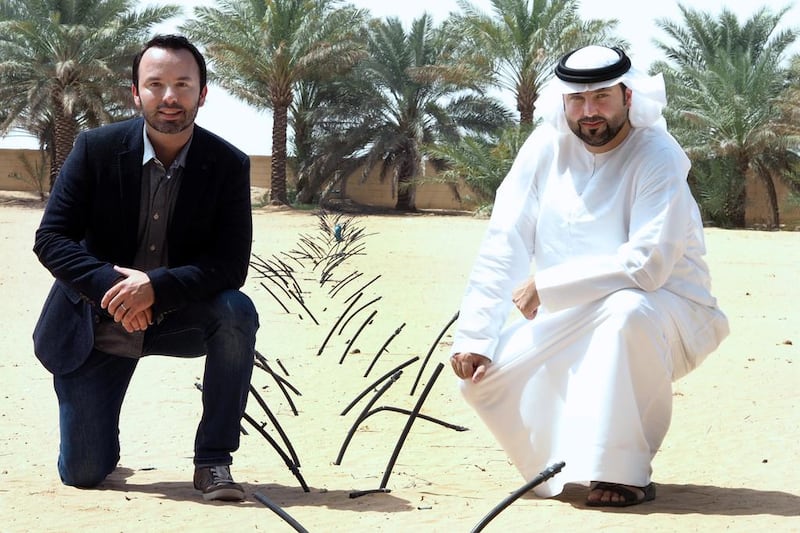Today the chips for smartphones are made in high-tech clean rooms – and, from next summer, so could the food on your plate, according to a “smart” farming venture launching in the UAE.
About 80 per cent of food consumed in the country is imported, according to the Ministry of Economy, bringing huge economic and environmental implications with it.
But one new entrepreneurial venture has a bold solution on the table. Pure Harvest, cofounded by Sky Kurtz, a former private equity investor based in Silicon Valley, and his Emirati business partner Mahmoud Adi, plans to bring the latest hydroponic farming techniques to the UAE – a process of growing plants in solutions, rather than soil, allowing for the careful control of the nutrients the plants receive.
And this, they say, could eventually lead to the country becoming a food exporter.
The operation – funded by a US$1 million investment from Shorooq Investments, Mr Adi’s family investment vehicle – has bought a farm in Nahel, a rural town about 30 minutes north of Al Ain. A $2.5 million to $3m fundraising round is in the pipeline, which Pure Harvest hopes to complete in January. If that goes ahead, the venture plans to install the latest high-tech farming kit on site, and could be harvesting its first crop – tomatoes – next summer.
“It is a factory, not a farm,” Mr Kurtz says of the proposed facility.
Pure Harvest’s first production centre plans to incorporate the latest Dutch technology – although Mr Kurtz says a supplier has not yet been signed.
The Dutch have a long history of innovation in horticulture, with many of today’s leading greenhouse technologies and hydroponic methods originating from Holland, says Mr Kurtz.
Crops will be grown year-round in a “natural substrate”. The substrate – or the material chosen by Pure Harvest – will be derived from coconut shavings. No pesticides will be used, but because the produce is not grown in soil it will not be classed as organic under European guidelines – a rule Mr Kurtz calls “arcane and silly”.
Under Pure Harvest’s plans, internet-connected sensors will monitor crops and precision-feed individual plants according to need, while the air will be dosed with CO2 to make the plants grow like they are “on steroids”, Mr Kurtz explains. “We are able to control the climate around the crop within 1°C. And in doing so, it doesn’t know that it is not growing in the heart of Holland.”
Workers will have to be washed down before they enter the building, and wear suits inside, to keep pests outside and keep it “incredibly pure and natural inside,” Mr Kurtz adds. “It’s almost like a clean room.”
While other hydroponic farms already exist in the UAE, such as Elite Agro and Emirates Hydroponics, both in Abu Dhabi, Mr Kurtz says Pure Harvest will bring the latest agriculture technology to the country for the first time.
Mr Adi says it has the potential to wean the UAE off its food imports in the long term.
“That is solving a food security problem,” he says. “If we can produce locally at a similar quality and guarantee supply around the year, we think there would be less demand for the imports.”
The first crop Pure Harvest plans to grow is tomato, but that will be expanded to other crops such as capsicum and cucumber, Mr Adi says.
The produce would be sold with a “meaningful discount” compared to imported food, but Mr Adi could not disclose the percentage savings.
The UAE could even become a food exporter if such technology took off, Mr Adi says.
“I truly believe that we can be the food basket not only for the GCC but also for other places. In Europe, what happens in the winter is that the cost of production of food goes through the roof because then you need a lot of heating. There is a nice business to be made by shipping food in the other direction,” he says.
But Howard Resh, a hydroponics consultant based in Canada and author who has worked on projects in the Arabian Gulf, says that the capital and operational costs in such ventures can be high.
“I think the cost of production would be far greater than field-production importation,” he explains.
Mr Kurtz acknowledges that the technology is not cheap and would require significant energy for cooling. But he says Pure Harvest will still be “far more sustainable” because the food does not have to be transported by air and uses less desalinated water.
“[Our food will be] picked less than 100 kilometres from where it’s consumed,” he adds. “Our aspiration is to build a major agriculture player in the region. I believe we can scale and grow.”
business@thenational.ae
Follow The National's Business section on Twitter





